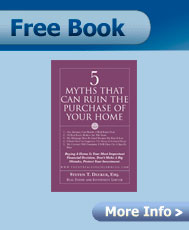Should I wait for the market to go lower or will the Presidents plan lead to a rise in housing prices and interest rates?
President Obama’s economic policies are attempting to rescue the real estate market and aid floundering lenders and homeowners. If successful his policies will cause housing prices and interest rates to rise. While this is good news for banks and hurting homeowners this change will adversely affect two groups who should be benefiting from the current real estate downturn, owners who can refinance and people looking to purchase homes. By continuing to wait to refinance or purchase members of these groups may very well miss a once in a lifetime opportunity to lock in low interest rates and acquire homes for record low prices.
Today, the great fear of people considering refinancing their mortgage or those seeking to buy a home is that they should wait as the market may go lower. The fear that interest rates will go lower or that they will overpay for a property that may decrease in value. While understandable these fears will cause many people to miss the tremendous house pricing and interest rate values currently available. The market may go lower and interest rates and prices could go a little lower but these risks must be weighed against the benefits currently available with interest rates below 5% and record foreclosures driving prices down. My concern for people waiting on the sidelines is how quickly interest rates and prices will rise once the new economic stimulus policies kick in and the recession ends. Will increased economic activity lead to inflation and increased interest rates? Will a bailout plan for banks and homeowners lead to more people keeping their homes? Either of these outcomes will increase the cost of homeownership to those who miss the current market opportunity.
Mortgage interest rates are at remarkable lows and I have many clients refinancing or purchasing with loans closing at interest rates below 5%. These rates are a function of the US governments attempts to help ailing banks and aid the depressed real estate market. In order to help lenders drowning in sub prime foreclosures the Federal Reserve is lending to banks at historic low rates. The Fed is lending to banks at ¼% interest to encourage them to make mortgages. When borrowing from the Fed at a low rate lenders have been happy to lend it on mortgages paying 5%. This can’t last forever so two groups need to take immediate advantage of these low rates, current owners and homebuyers. Homeowners can get an immediate benefit by refinancing their current loans. They can lower their monthly payments and if they have an adjustable rate get a low fixed rate. Homebuyers can get more for their mortgage dollars by getting a lower payment or a higher loan amount to allow them to buy a more expensive house. The current interest rate climate will change once the housing crisis starts to abate. This will lead to the Fed increasing rates and the mortgage rates will rise.
Foreclosure sales are driving the market lower. With the record increase in foreclosures more distressed homes are for sale and this has lead to a decrease in median home prices. It also affects the psychology of buyers who believe that lower prices are real. With an increase in bank owned properties and short sellers looking to dump properties the effect on non-distressed properties is evident. Looking at the residential market in Staten Island, Brooklyn and Queens I see the effects rising foreclosures have on the market. There is a direct correlation between foreclosure activity and price reductions. In areas with large numbers (Port Richmond in Staten Island, St Albans in Queens, East New York in Brooklyn) prices are down markedly whereas in areas with little foreclosure activity prices have not fallen nearly as much. If the number of foreclosures is decreased the number of homes for sale will fall and prices will rise. President Obama’s stated goal to reduce foreclosures can only lead to a decrease in the number of homes for sale as lenders and homeowners will have less pressure to sell overvalued properties.
The President’s stated goal to help the real estate market is still being developed and implemented. Once it takes effect the results could be startling. Make sure you don’t miss the opportunity the current market offers.
 November 8th, 2013
November 8th, 2013 

